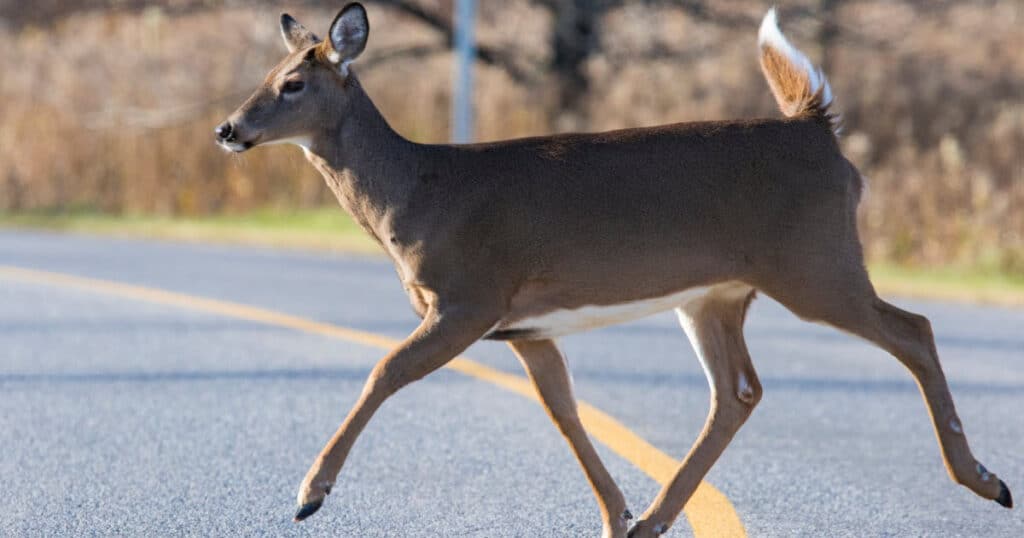Do you live or drive in a state with a large deer population? If so, you may be concerned about ending up in a deer collision. Cervids are known for suddenly running into the road, and we’ve all heard of the expression, “deer in headlights.” Today, we’ll reveal the answer to a common question: does hitting a deer go on your driving record?
Hitting a deer is upsetting and can be quite dangerous. In fact, these accidents can be fatal to the drivers and passengers involved. On top of those concerns, you’re wondering whether hitting a deer will affect your Motor Vehicle Record (MVR), otherwise known as your driving record.
So, Does Hitting a Deer Go On Your Driving Record?
Table of Contents
ToggleLike other aspects of traffic regulations and law, the rules related to hitting a deer may vary from state to state, so there isn’t a single answer to this question that applies across the board to everyone.
Overall, hitting a deer won’t end up on your driving record unless someone else’s vehicle or property is damaged. Usually, a collision with a deer that only affects you and your own vehicle won’t be included on your record.
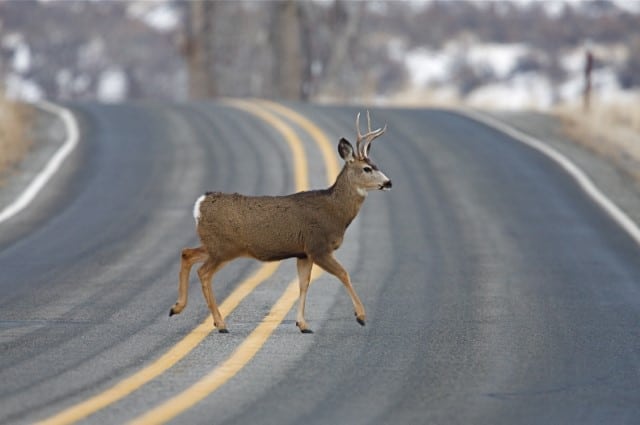
The formal name for your “driving record” is your Motor Vehicle Record (MVR). Your motor vehicle record shows things such as accidents you’ve been involved in, traffic tickets, and violations.
Will Hitting a Deer Affect Your Insurance?
Sometimes incidents that won’t affect your driving record will impact your insurance. Luckily, deer collisions, as long as they’re not your fault, usually won’t affect your premiums.
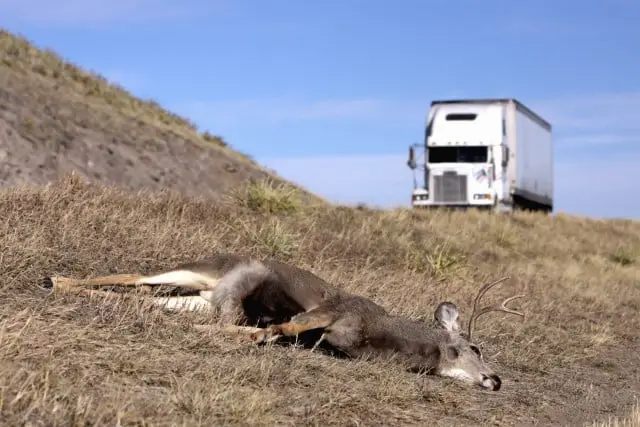
As long as you have the right kind of insurance, you should have coverage for the damage caused by a deer collision. You need comprehensive coverage to ensure that you have coverage in the event of a deer collision.
In most cases, your insurer won’t consider a deer collision to be the driver’s fault. However, if you have a collision with another car or even a guard rail as a result of swerving to avoid a deer (which you should never do), your insurance company may say you’re at fault.
What Kind of Insurance Covers Deer Collisions?
You should have comprehensive coverage if you live or drive anywhere where deer may run into the road. This is the kind of vehicle insurance coverage that covers deer collisions.
As long as the collision isn’t deemed to be your fault, there probably won’t be any increase in your insurance premiums.
That said, don’t assume that your insurance includes comprehensive coverage. Many plans don’t.
So, if you think there is any chance you could ever have a deer collision, make sure to contact your insurance company.
What is Comprehensive Coverage?
Comprehensive coverage is the type of car insurance you need to have coverage for damage caused by hitting a deer.
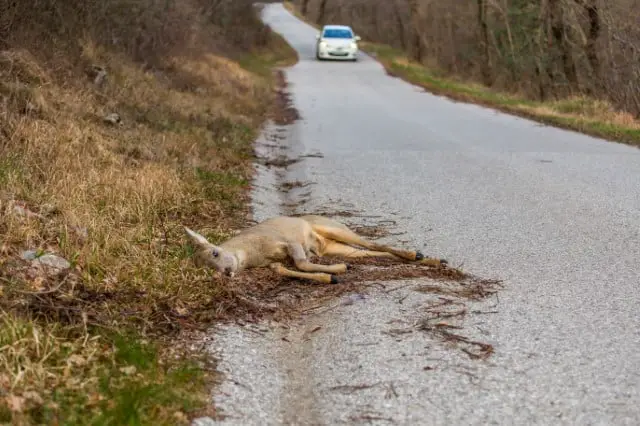
Comprehensive coverage is an extra that you add to your vehicle insurance policy. Many policies don’t automatically include it, so check with your insurance company to make sure you have it.
Comprehensive coverage is an optional level of coverage. It specifically covers any damage to your car that is caused by deer collisions and non-collision events that you cannot control. Examples include acts of nature, fire, glass and windshield damage, and vandalism.
If you’re leasing your car, you probably already have comprehensive insurance, as the dealership likely requires it. However, you should look into this to make sure.
If you own your car, however, you probably don’t have comprehensive coverage unless you have specifically asked for it from your insurance company.
How to Know if You Have Comprehensive Coverage?
You will need to contact your insurance company to find out whether your current plan includes comprehensive coverage. Verify with them that their comprehensive coverage covers deer collisions.
If you find that you don’t have comprehensive coverage, ask for information about how much your premiums would increase if you took on this coverage.
Do You Have to Report When You Hit a Deer?
The exact rules on this vary from state to state, so make sure you know the rules where you live and drive. In some places it is illegal to hit a deer and then drive off, so know your local laws.
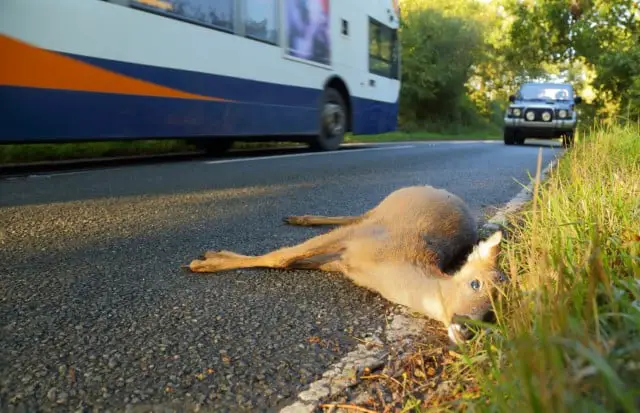
In general, after you hit a deer it is a good idea to report a deer collision to the local authorities. A situation when you are definitely required to report the incident to police is if your car and/or another vehicle is damaged, or if someone is injured.
If you have a deer collision and the animal is injured, you should notify the local wildlife authorities. That way, they can try to look for the animal.
If you have a severe deer collision, you may have to get your vehicle towed. That is because it may not be safe to drive.
Summarizing Factors That Could Affect Your Driving Record
A deer collision in which you’re not at fault won’t affect your driving record, as long as there aren’t any other vehicles damaged or people injured. But if your deer collision causes damage to another vehicle or someone else ends up with an injury then the accident will probably affect your driving record.
Related Frequently Asked Questions
Here are some frequently asked questions and our answers about deer collisions.
Can you collect insurance for hitting a deer?
If you have comprehensive coverage as part of your vehicle insurance package, you will probably be able to collect insurance for a deer collision.
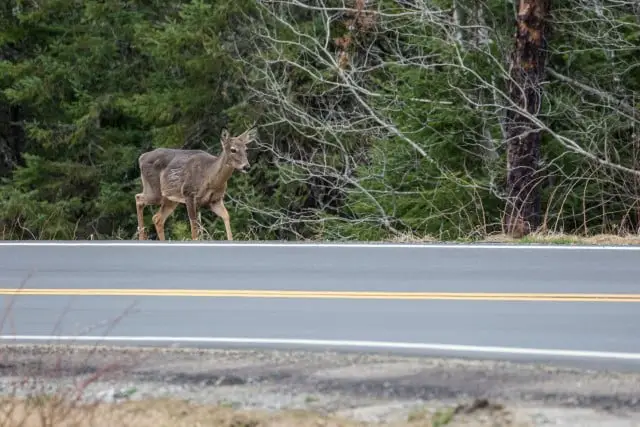
Don’t assume that you have this kind of coverage. It is considered an extra by many insurance companies.
So, if you live and/or drive somewhere with many deer and you feel there is a significant risk of deer collisions, make sure that you add comprehensive coverage onto your plan.
Is striking a deer with your car an at-fault collision?
No, a deer hit isn’t considered an at-fault collision. If you just hit a deer (or any other animal because it suddenly appears in the road), the insurance companies and relevant authorities won’t consider it your fault.
The only way you will be considered at fault is if something happens that is related to the presence of the deer but involves causing damage to another vehicle or injury to another person. An example might be if you swerve to avoid a deer (which you should never do) and end up hitting another car.
I hit a deer but it ran off. What should I do?
If you hit a deer and it runs off injured, you should contact the local wildlife authorities.
Also, you need to check your vehicle for damage. Take some photos of your vehicle, any blood or hair on it from the deer, and the damage that was incurred.
You need to document the accident. If there are any witnesses and they stop, ask them about what they saw. You should also ask how you can contact them.
If you notice that the deer seems injured, you should try to call the local authorities. Don’t try to run after the deer. Injured animals can be dangerous.
Does hitting a deer count as an accident?
Yes, hitting a deer is considered a collision, or accident. However, it isn’t the kind of accident that is included on your driving record. That is because you aren’t considered at fault.
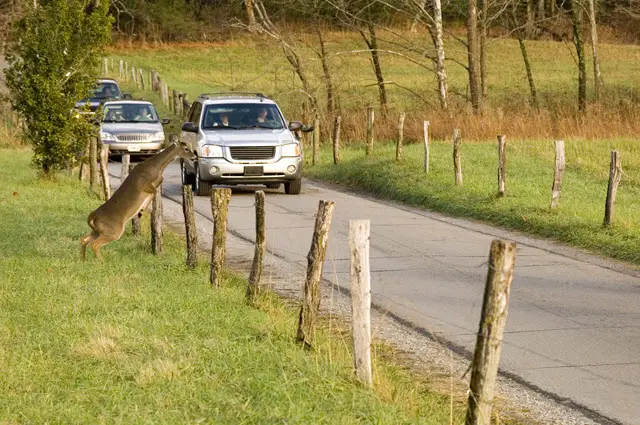
But what if you swerve to avoid hitting a deer and end up hitting another car or a guard rail? Yes, that will go on your driving record.
That is one reason you should never swerve. Instead, drive slowly and exercise caution when driving in areas with deer.
Our Final Thoughts
As we’ve learned here, hitting a deer doesn’t go on your driving record. But what about insurance?
If you hit a deer that suddenly appears in the road, it probably won’t affect your premiums.
However, the only way you’ll have insurance coverage for damage caused by a deer collision is if you have comprehensive coverage.
Many insurance plans don’t include this level of coverage, as it is considered an extra. So, if you live and/or drive in an area with deer, you should add comprehensive coverage to your plan.

